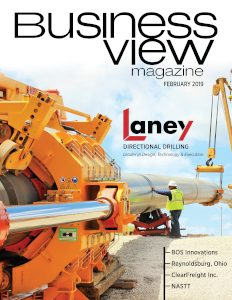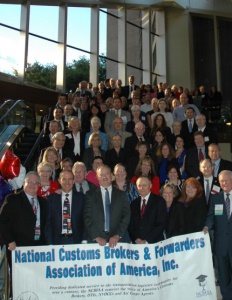The National Customs Brokers & Forwarders Association
The voice of the logistics industry
Business View Magazine interviews representatives of the NCBFAA, as part of our focus on the American logistics sector.
The National Customs Brokers & Forwarders Association of America (NCBFAA), headquartered in Washington, DC, is the voice of the transportation logistics industry in America, representing more than 1,000 member companies, with 110,000 employees in international trade. NCBFAA members include the nation’s leading freight forwarders, customs brokers, ocean transportation intermediaries (OTIs), NVOCCs (non-vessel operating common carriers – persons or companies that organize shipments for individuals or corporations to get goods from the manufacturer or producer to a market, customer, or final point of distribution), and air cargo agents, serving more than 250,000 importers and exporters.
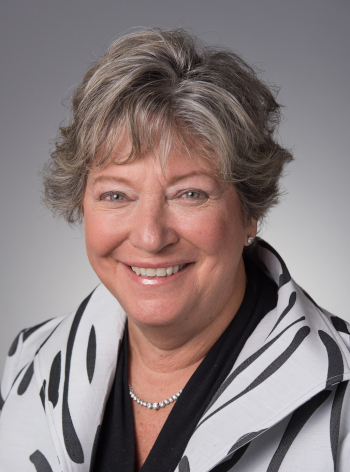
Amy Magnus, President
The NCBFAA was founded in New York City in 1897 as the Customs Clerks Association of the Port of New York. Customs clearance during that time was an all day affair, involving physical counting, inspecting, record keeping, copying (with pen and quill), and affixing stamps and seals. Service, integrity, and trust became the foundation upon which the industry would grow and prosper, and with that growth and prosperity came the need to organize and launch a collective voice.
While American industry was on the rise, an isolationist philosophy kept foreign trade at bay. Growth for many brokers was slow, but steady, and the industry remained mostly a family affair; company reins were passed on to wives, sons, and daughters. Over time, partnerships emerged and business continued to grow, with New York as the center of it all. On March 9, 1922, the New York Customs Brokers Association was organized to succeed the previous organization, with only licensed Customs brokers of the Port of New York, eligible for membership.
The aftermath of the Great Depression brought hardships to many customs brokers. This was due partly to the 1930 Smoot-Hawley Tariff Act, which raised tariffs on over 20,000 imported goods, causing trade to slow almost a standstill. In 1934, President Roosevelt initiated a series of tariff reductions that helped foreign trade rebound, while brokers recognized that government needed a better understanding of industry issues. Government learned a lesson, too, as all took note of the importance of trade to the overall economy.
During World War II, the Port of New York closed, and New Orleans became the foremost port in the country. Most of the freight forwarders in New York moved to New Orleans, some to Mobile, Alabama, and some to Tampa, Florida, as the 1940’s witnessed the emergence of the freight forwarder as a prominent partner in the industry – transporting products to their ultimate destination became as important as getting those products cleared through Customs. In 1945, the bylaws of the New York Customs Brokers Association, Inc., were amended to include all licensed customs brokers in the United States, and not just those from New York; and in 1948, the Customs Brokers and Forwarders Association of America, Inc., (CBFAA) was incorporated, which made forwarders eligible as regular members on a national basis, and as associate members on an international basis.
In 1962, the Association changed its name to the National Customs Brokers & Forwarders Association of America, Inc. (NCBFAA), to better reflect a new and wider scope. Restructured dues funded a national staff, and border areas and region designations with appropriate representation found new members to shoulder the industry’s increasing business concerns. Membership was open to international air cargo agents in the United States and non-vessel operating common carriers. Associate and Affiliate membership designations expanded.
Today, the NCBFAA continues to represent its members by maintaining a close watch over legislative and regulatory issues and by keeping them informed through its weekly Monday Morning eBriefing, as well as various meetings and conferences throughout the year.
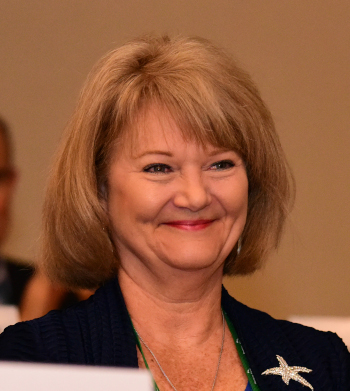
Jan Fields, Vice President
Recently, Business View Magazine spoke with three current NCBFAA officers: President, Amy Magnus, the Director of Customs Affairs and Compliance, A.N. Deringer, Inc., Champlain, NY; Vice President, Jan Fields, Corporate Director of Risk Management at John S. James Co.; and Executive Vice President, Megan Montgomery, former Principal Consultant for the Washington, DC-based MWM Consultants, and former Director of Government Affairs at the American Association of Exporters and Importers, to find out more about the Association and the businesses it represents. The following is an edited transcript of that conversation.
BVM: Can you explain what customs broker does?
Magnus: “Essentially, we facilitate trade. We do that by making sure that all the documentation, the data, the information that’s required to bring goods into or out of the United States, is properly prepared and transmitted to Customs and the other government agencies who control the requirements for imports and exports. So, a potential importer or exporter will contact a customs broker and ask for help in making sure that they are in compliance with all the rules, laws, and regulations that govern imports and exports, and then the broker will prepare the necessary information, present it to the agencies –Customs and the border protection system – which then makes sure the data goes to all the other agencies who have an interest in that data. We also provide advice and assistance to importers and exporters. We have a wealth of information we can share with our clients about how to make sure they are compliant and also look for strategies to economize, in the best possible way, to bring their goods into or out of the U.S.”
BVM: What about a freight forwarder?
Fields: “An international freight forwarder has a two-fold responsibility. What we do is facilitate the movement of cargo. We can arrange to have the cargo travel from door to door; from the inland destination all the way to the foreign country; over the road, or by air freight or ocean freight. We also handle the documentation that’s required. We assist the exporter to ensure that U.S. laws are adhered to, as well as the requirements to get cargo into another country. We educate our clients as far as what needs to be done to be in compliance to ensure that the cargo can be picked up when it arrives at its destination.” As an NVOCC, we act as a logistics provider.
Magnus: “The customs broker handles the data that customs and other government agencies require, whereas the forwarder is responsible for the actual transportation of the goods. And many of our members do both. It is not uncommon that the customs broker also assists in providing transportation and logistics needs up to, and including, warehousing. We have members that are brokers and freight forwarders, and a combination – full logistics providers. We have some of the largest companies that you can imagine and we also we have operations with one or two employees in the company. So, we have the full range: the really large logistics providers, right down to the privately-owned, mom-and-pop type operations. We run the full gamut.”
BVM: Why should a company join the NCBFAA?
Magnus: “As far as the benefits we provide, we wouldn’t be able to do the work we do, as well as we do it, without being a member of NCBFAA. I say that because it is our source of information. All of our members can participate in our committees and our meetings where we share information and advice. So, we have our ear to the ground about what’s going on in our industry. If there’s any type of trend or any type of concern in any of the ports of entry, it funnels into the NCBFAA committees, where we can discuss and strategize around some of the changes that we’re seeing. And in the last two years, we have seen an enormous amount of change. Just keeping up with the requirements would be impossible on one’s own. Within the Association, we have committees, and the active members who serve on these committees are experts in their specific areas, and we all get to benefit from that expertise. Our Association is packed with experts in almost any area of trade you can name. So, when we provide a service to a client, we really know what we’re talking about.”
Fields: “Also, within the NCBFAA, we have an educational arm, the NEI. It provides educational opportunities, not only for our members, but for all exporters and importers. We gear that towards keeping everyone in compliance. We have two conferences a year – an annual conference and a government affairs conference in DC, where we meet with our Senators and Representatives and any of the committees that we need to meet with. If there is an issue that comes up, we’ll send a representative to DC. We also have webinars; we have several opportunities to become certified as an export specialist or customs specialist; we have entry level programs that can train members that are new in the industry; we also have master level programs for people who want to get higher certifications other than a customs broker’s license.”
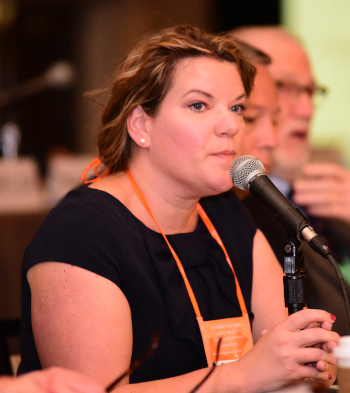
Megan Montgomery, Executive Vice President
Montgomery: “Our former President, Geoff Powell said, ‘An educated client is a good client,’ and we really desire that our clients understand the complexities of the regulations and legislation that governs them and how to best engage in international trade. So, the Education Institute works hard to keep everybody apprised of what’s going on, what’s coming down the pike, what’s just happened.
“We have a communications department. They put out a weekly eBriefing. Sometimes it’s several pages long; sometimes it’s more of a bulletin. We feel strongly that for brokers and forwarders, it’s the best weekly bulletin you’re going to get. We monitor the federal register; we monitor other news outlets, other communications from different agencies; it’s a one-stop-shop for what changes are coming at the industry, each week.
“We have an events department that put on events – an annual conference with about 600 members and friends. We gather for three days of education, side bars, and lots of participation from our government partners. Regulators come to speak and listen to our panels to hear what’s going on within the private sector, and we’ve got press covering the event. We do that every spring. In the fall we have a much smaller, government affairs conference to talk about the issues facing our industry.”
Magnus: “We go on the Hill and lobby for our causes. We’re also on a first-name basis with customs officials and other government agency officials. We meet with them frequently, we share concerns; we’re considered the go-to group for these officials. That’s another advantage that we have; we can reach out to high level government officials to discuss trade issues as they’re emerging.”
BVM: Can you discuss some of those recent issues and how the Association dealt with them, for example, the new round of tariffs that have been imposed on imports?
Magnus: “The first round of duties that the President put forward was on solar panels and washing machines. That didn’t impact us quite as much because it’s a very narrow focus. Then we had the steel and aluminum duties – what we call 232 duties – and those became somewhat disruptive for people in our industry. Whether we agree with them or not, we still have to assist our clients in making sure that their imports are compliant. Before the 232 duties on steel and aluminum, goods were coming into the United States from Canada and Mexico, duty-free, under the provisions of NAFTA. All of a sudden, we now have 10 or 25 percent duties on steel and aluminum coming in from Canada and Mexico. So, you can imagine that that was difficult for us to educate our clients on the most expeditious and safest way to pay these duties to the government.
“And then, just as we were adjusting to that with systems in place, including software upgrades and the capability to transmit this additional information to Customs, because they needed additional data in order to collect the information on these duties, we had the 301 duties on goods from China. And, there again, goods that had had a lower rate of duty, suddenly were subject to a 25 percent duty. To suddenly be confronted with having to pay a 25 percent duty rate when your contracts had been negotiated, prices fixed, and budgets planned – to have to deal with this additional duty amount created a hardship for a lot of our companies. They needed counseling from us about any possible ways for this duty to be mitigated: Can they file for an exemption and not pay it? Can they source from another country? Can they manufacture the product in a different way? All of those questions have been percolating up from our clients and it’s been taxing for everybody, and a lot of people needed help around that.”
BVM: Any final thoughts about the Association?
Montgomery: “We have 12 staff plus volunteers, and I have never seen more dedicated and selfless volunteers who link arms and work together for the betterment of the industry. Our members are the unsung heroes of international trade, and we could not keep the borders flowing without expert brokers and forwarders. We feel that we have a lot to offer and according to our last study, our retention rate was about 93 percent. So, we feel that when folks join us to make our Association and industry stronger, they feel that they get good value for their money.”
Magnus: “Don’t consider importing or exporting without having a member of NCBFAA on your side.”
AT A GLANCE
WHO: The National Customs Brokers & Forwarders Association of America
WHAT: A trade association representing the logistics industry
WHERE: Washington, DC
WEBSITE: www.ncbfaa.org

